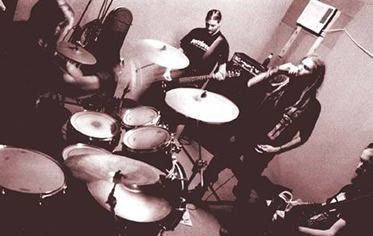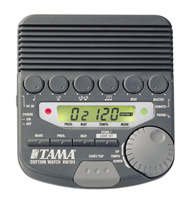
As drummers, our main task is to play a beat that is on time so the other band members can follow. That is the number one description of a drummer! There is a lot a drummer can add to a song; however before getting ahead of themselves they need to make sure they are on time. Learning how to stay on time can be a very tricky task, especially if you are playing in odd time signatures, or playing very fast tempos. This article is deigned to give drummers ways to help themselves practice their internal clock, so they can keep themselves and the whole band on time!
When a drummer feels the beat of a song, they develop an internal clock inside of them that keeps time in their head. This is done by everyone, not just drummers; however drummers are more in tune of this. The problem with this self metronome is it can speed up and slow down at any time. One of the biggest problems drummers struggle with is speeding up the beat when they get excited. They will be playing a basic beat, and as soon as they get a chance to play a fill or solo, they will start speeding up the tempo along with the energy. The worst part about this is no drummer will admit it! The reason for this is they get so into the song, that they have no idea they are speeding up or slowing down. That is where this next step comes in handy.
 The first step in developing your timing is being humble and listening to your band mates. They will be able to tell when you speed up or slow down a lot easier then you. Make sure you do not become super defensive and start an argument. Take their advice as constructive criticism and try to concentrate more on the more energetic parts to the song. Now in saying this, the drummer is not the only musician that speeds up during songs. Every musician tends to have this problem, whether they are experienced or not; as soon as the energy builds, so does the tempo. So while you are now listening to the bands criticism, also listen to their playing. When you can identify when and where they are speeding up or slowing down, you can really attack the timing issue at full force. This is where a drummer is needed the most, so make sure you can really hear and listen to your band.
The first step in developing your timing is being humble and listening to your band mates. They will be able to tell when you speed up or slow down a lot easier then you. Make sure you do not become super defensive and start an argument. Take their advice as constructive criticism and try to concentrate more on the more energetic parts to the song. Now in saying this, the drummer is not the only musician that speeds up during songs. Every musician tends to have this problem, whether they are experienced or not; as soon as the energy builds, so does the tempo. So while you are now listening to the bands criticism, also listen to their playing. When you can identify when and where they are speeding up or slowing down, you can really attack the timing issue at full force. This is where a drummer is needed the most, so make sure you can really hear and listen to your band.
Obviously to develop timing and preciseness, you will have to practice with a metronome. This is one of the most important things to do as a drummer. Whether you are playing basic  rudiments, or a drum solo, make sure you are using a metronome. The next time you practice with your band, (if you can) play a click track behind yourselves. You will be very surprised at the results! When you practice with a metronome, you will be able to notice when you tend to speed up or slow down. Sometimes it is when you are getting tired; sometimes it is when you are playing fills; whatever the case - you need to know. A click track will force you to stay on time. This will help to develop the internal clock more, as you will hear the proper tempo throughout your playing.
rudiments, or a drum solo, make sure you are using a metronome. The next time you practice with your band, (if you can) play a click track behind yourselves. You will be very surprised at the results! When you practice with a metronome, you will be able to notice when you tend to speed up or slow down. Sometimes it is when you are getting tired; sometimes it is when you are playing fills; whatever the case - you need to know. A click track will force you to stay on time. This will help to develop the internal clock more, as you will hear the proper tempo throughout your playing.
 A drummer always wants to show their talents in a song. Whatever the skill level of the drummer, they will always push their limits and strive to play the most innovative solos, fills, and beats. What every drummer needs to remember is that no matter how amazing the fill is, if it is not in time, it will sound bad. I have heard some amazing drum beats that just sound terrible due to the timing. If you are playing a crazy drum fill but come in late, the whole band looks bad. So remember that timing is everything. If you need to, play a simpler beat or fill just to make sure you are not speeding up or slowing down. When you have mastered the art of timing, you will be able to switch from regular time to half time with ease! When you play a whole show with perfect timing, you will be looked at as more of a professional drummer. Besides, you can always show off in your drum solo where YOU make the tempo!
A drummer always wants to show their talents in a song. Whatever the skill level of the drummer, they will always push their limits and strive to play the most innovative solos, fills, and beats. What every drummer needs to remember is that no matter how amazing the fill is, if it is not in time, it will sound bad. I have heard some amazing drum beats that just sound terrible due to the timing. If you are playing a crazy drum fill but come in late, the whole band looks bad. So remember that timing is everything. If you need to, play a simpler beat or fill just to make sure you are not speeding up or slowing down. When you have mastered the art of timing, you will be able to switch from regular time to half time with ease! When you play a whole show with perfect timing, you will be looked at as more of a professional drummer. Besides, you can always show off in your drum solo where YOU make the tempo!
These are basic steps a drummer can take to help his timing. These are not just tips for drummers though, share them with your band. Make sure you are all working together on your timing. If you are a solo drummer, then make sure you are practicing lots with a metronome so when you are looked at for work you are bang on time! Once you have perfect timing, you are well on your way to becoming a professional drummer! Good luck with this, and have fun practicing!